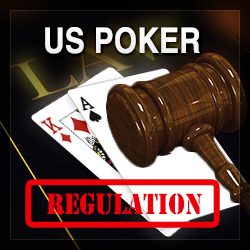 Black Friday of poker is one day that many poker enthusiasts in the US would like to forget. And very soon, that could be a possibility, as states get ready for legalization of online poker, which is likely to happen sometime next year. Senators in different states including Nevada, California and New Jersey among others have been lobbying for the bill for legalized online gambling. The bill may have faced several hurdles in the past year but these senators are not the ones to back off.
Black Friday of poker is one day that many poker enthusiasts in the US would like to forget. And very soon, that could be a possibility, as states get ready for legalization of online poker, which is likely to happen sometime next year. Senators in different states including Nevada, California and New Jersey among others have been lobbying for the bill for legalized online gambling. The bill may have faced several hurdles in the past year but these senators are not the ones to back off.
The American Gaming Association (AGA) is also campaigning for a bill to legalize online poker. The bill, if passed, will allow online poker but bans other forms of gambling online, including lotteries. The bill may have an opportunity in the congress before the year ends, thanks to the ongoing fiscal cliff debate in Washington. This campaign may be the last chance for the AGA to push the federal bill, but it is also its best chance, according to Poker Players’ Alliance executive director, John Pappas.
Online Poker to the Rescue
Debt is one of the reasons that the online poker bill may get approved. Given the current scenario, everything seems to be in favor of legalization of online gambling. It is not just important, but necessary for the congress to pass the online poker bill. For if the bill is passed, the online gambling industry in the US can generate over 10,000 jobs, and also curtail the unregulated online gambling activities in the country. It is estimated that within just five years, the states could benefit by around $10 billion only from the online gambling industry.
The latest bill for legalization of online poker carries 16% tax rate, of which 10% goes to the state where the player is located, 4% goes to the operator and 2% would go to the government. If the revenue is $1.6 billion, states would be able to pay up most of the $26.5 billion dollars that they owe the federal government, for unemployment fund loans.
Bill Might Get a Chance in the Congress
The bill, which is for allowing online poker but restricting all other forms of gambling, has been sponsored by Harry Reid, the senate majority leader, and John Kyl, the Senate Minority Whip. The bill allows sales of lottery tickets online, but prevents lotteries from expanding into other casino activities. According to the AGA CEO Frank J Fahrenkopf Jr., the congress has to act in the lame-duck session, or the country is going to see an aggressive expansion of online gambling, with states trying to generate revenue with it.
According to the bill, the games offered by American Native Indian casinos will be regulated by the Commerce Department of the federal government. The commercial casino operators’ games, however, will be under regulation of certain states like Nevada, New Jersey or Mississippi that have experience in regulation of gambling.
The wait for legal online poker, however, could be too long according to Fahrenkopf. The Reid-Kyl bill proposes a wait period of 15-months for setting up of the system, but the PPA hopes and wants the system to be ready much before that.
While the senators are pushing for the approval of this bill, The North American Association of State and Provincial Lotteries, which represents all the legal lottery operators in the US and Canada, is strongly lobbying against it.
State-by-State Online Poker Likely in 2013, Says Analyst
The AGA may be trying one last time for legalization of online poker, but you may have to be prepared for an entirely different scenario, according to one analyst. Andrew Zarnett, who is a gaming analyst associated with Deutsche Bank said that the possibility of individual states approving online poker legalization next year is high. Zarnett said that investors should prepare for a state-by-state rollout of online poker in 2013, even if it seems like legalization of poker has been stalled for now.
At present, Nevada is in the forefront of approving legalization of online poker in the US, with casino operators apply for licenses and gear up for the situation. According to Zarnett, the issue would be more about generating revenues and cash flows. He also said that for a successful roll out of legalized online poker state by state, issues such as tribal gaming authority, inclusion of the lottery system and most importantly, tax revenue distribution should be addressed.